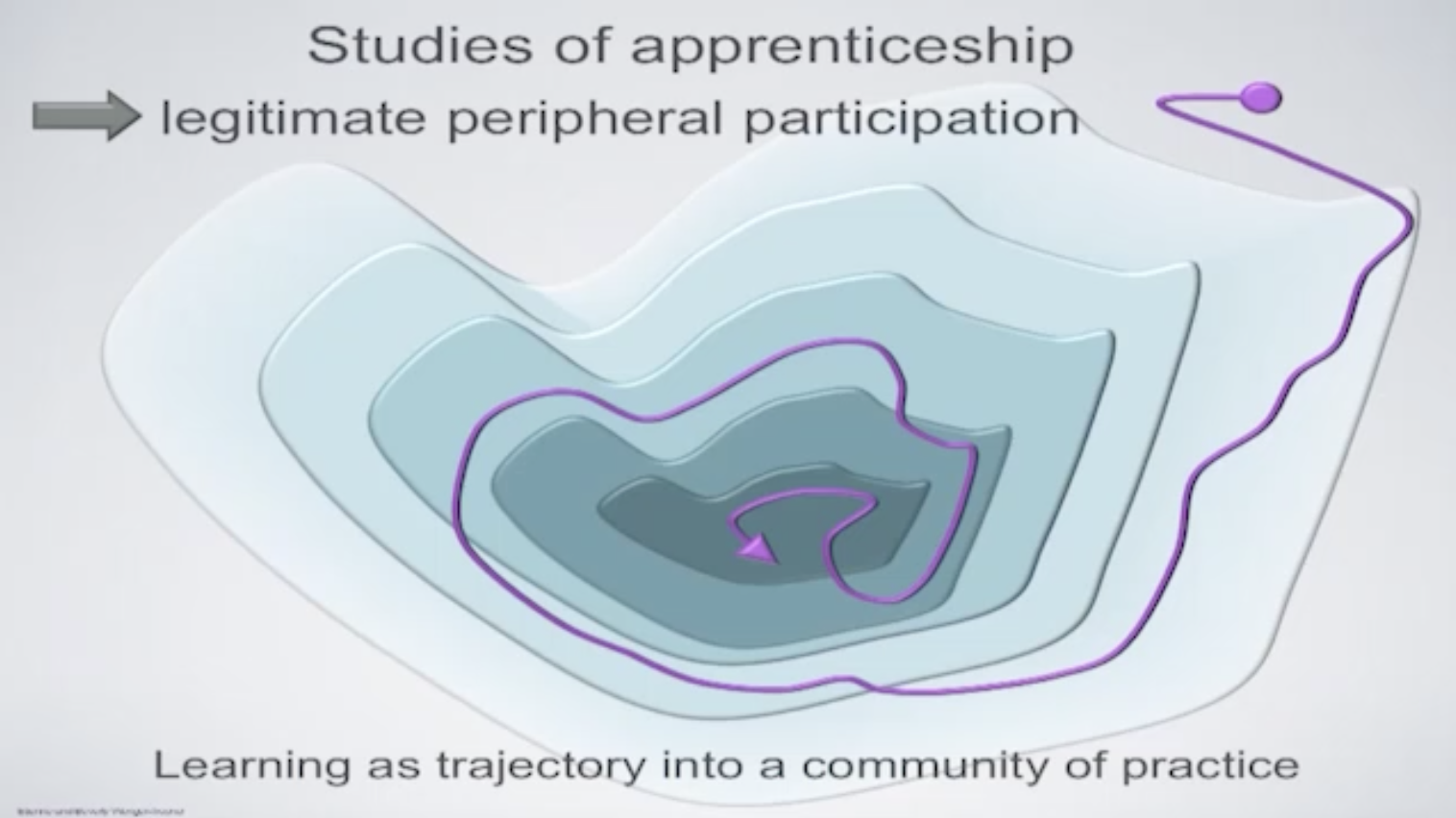TB872: Wenger-Trayner and communities of practice
Note: this is a post reflecting on one of the modules of my MSc in Systems Thinking in Practice. You can see all of the related posts in this category.

Étienne Wenger-Trayner is someone whose work I’ve come across on multiple occasions over the last 15 years. When I worked at Jisc, he was cited in meetings and reports and, these days, we use his concept of communities of practice in the co-op. For example, we ran some online Community Conversations sessions where we discussed his ideas around ‘value cycles’.
For this module, we’ve got the recording of the first part of a presentation he gave at the University of Brighton in 2013 entitled ‘Learning in landscapes of practice: recent developments in social learning theory’ (The Open University, 2021) and a chapter in the book Social Learning Systems and Communities of Practice (Blackmore, 2010).
I hadn’t realised that he coined the term ‘community of practice’ (CoP) to describe the social structures observed around traditional apprenticeships. Wenger-Trayner observed that learning is not simply a transaction between a master and an apprentice but involves the entire community.

During the presentation, he tells an anecdote about wine-tasting. A friend of his talked about a wine having a ‘purple nose’ which, because he was (and is) not a member of a wine-tasting community, he didn’t really understand. The same is true of other CoPs: they shape our perceiption and interpretation of experiences. What was just a ‘decent glass of wine’ is all of a sudden a much richer interaction if you have the language and understanding to appreciate it.
In her introduction to the section on CoPs, Chris Blackmore suggests why reference to them has “mushroomed” since Wenger-Trayner’s first book on the subject:
[D]ownsizing of companies in many parts of the western world and increased mobility of people from job to job has led to a need to find other ways to continue in professional relationships. The increased development and use of information and communication technologies, particularly the Internet, has generally made it easier for many to find out about and communicate with others beyond their own geographical areas. In responses to complexity, needs for different kinds of support have arisen – social, professional and personal. Business and industry imperatives have changed with increased globalisation with a range of new economic and ethical dilemmas to be addressed. Calls for sustainable development and concerns about climate change have presented new challenges in doing and learning with others, some of them undoubtedly addressed by CoPs praxis.
(Blackmore, 2010, p.103)
The chapter written by Wenger-Trayner with William M. Snyder (2004) addresses global challenges, suggesting that we require a “world learning system”. This, they suggest, should have the following “three basic specifications”:
(Blackmore, 2010, p.108)
- Action-learning capacity to address problems while continuously reflecting on what approaches are working and why – and then using these insights to guide future actions.
- Cross-boundary representation that includes participants from all sectors – private, public, and nonprofit – and from a sufficient range of demographic constituencies and professional disciplines to match the complexity of factors and stakeholders driving the problem.
- Cross-level linkages that connect learning-system activities at local, national, and global levels – wherever civic problems and opportunities arise.
The chapter calls for an evolutionary approach to building a world learning system, and explains the role of communities of practice can have in creating a discipline of “world design” focused on strategic social learning systems. This involves a fractal approach, to make it possible to “significantly increase the scale of a community-based learning system without losing core elements of its success” (ibid., p.120).
One thing that CoPs struggle with, especially in the civic arena, is stewardship. Coalitions “do not take sustained responsibility for stewarding a civic domain or for bringing together the full array of stakeholder constituencies to identify and address short- and long-term priorities” (ibid., p.113). Instead, some individuals or organisations may participate “in multiple communities in ways that help interweave relationships in the broader community”. Consequently, “they become brokers of relationships between levels in equivalent types of communities” because “I trust people trusted by those I trust” (ibid., p.121).
Importantly, the authors point out that “the evolution of a learning system must… be paced at the time-scale of social relationships, not according to an externally imposed objective to achieve short-term results” (ibid.). Some of these social relationships will involve conflict, especially when the aim of the community is to try and solve previously-intractable problems. Dealing with conflict helps build trust, which again, takes time.
A community of practice approach, while useful, is not “a silver bullet for solving the problems of the world” but rather a way to align “community activities within a broader ecology of formal an informal structures – institutions, cultural groups, laws, and social networks” (ibid, p.123).
References
- Blackmore, C. (ed.) (2010). Social learning systems and communities of practice. London: Springer. Available at: https://doi.org/10.1007/978-1-84996-133-2.
- The Open University. (2021). ‘3.3.5 Wenger-Trayner: communities of practice, TB872: Managing change with systems thinking in practice. Available at https://learn2.open.ac.uk/mod/oucontent/view.php?id=2171593§ion=3.3.5 (Accessed 25 February 2024).
Image: DALL-E 3


Have you started to delve into the new stuff extending CoPs into social learning spaces – https://www.wenger-trayner.com/learning-to-make-a-difference-book/
Thanks! I’ll take a look 🙂
I have used Etienne Wenger’s work frequently since some 20yrs. Bev and Etienne Wenger-Trayner’s work on social learning landscapes and convening / intervening in systems is a to me enormously helpful extension for my current work. Last fall we took a training with them about systems covening and social learning landscapes with our entire team. Very useful.
I remember you mentioning it! Sounded amazing 🙂